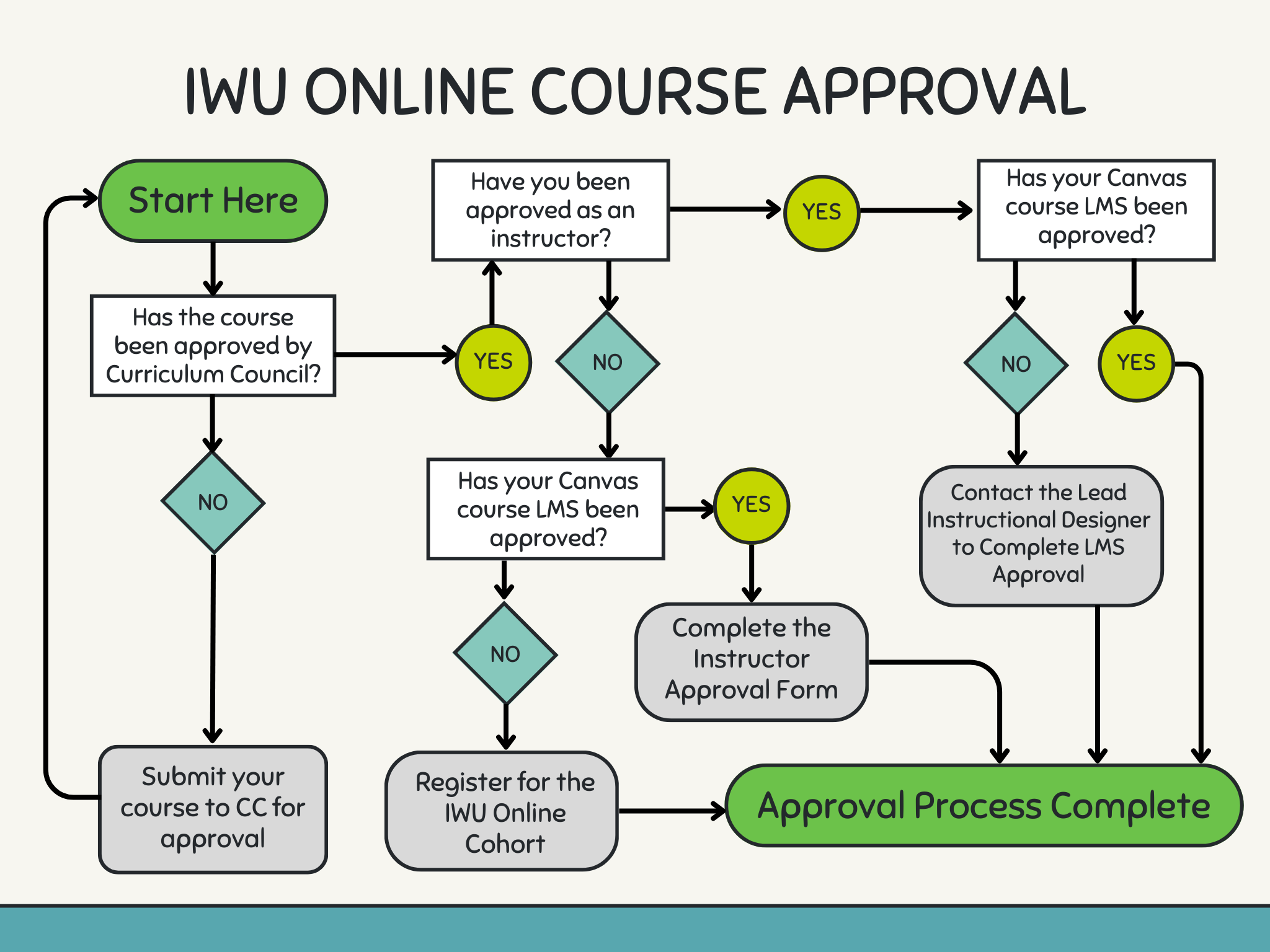Online Teaching
The Dean of Curricular and Faculty Development, along with Thorpe's Instructional Design team, coordinate routinely with Faculty to develop IWU's approach to online teaching. As online learning becomes more prevalent, it is more important than ever to encourage best practices for all instructional modalities. We are here to support you in that endeavor!
On this page:
Online Learning at IWU
To ensure IWU meets HLC Accreditation standards and Title IV funding requirements for online learning, ALL online learning courses must include the following three approvals:
- Course (submit course approval through the Curriculum Council)
- Canvas LMS (must be approved for each new online course offering)
- Instructor (approved once, regardless of how many online courses are being taught)
Approval Process
Once the course has been approved through Curriculum Council, there are two avenues for completing the approvals for the Course LMS and Instructor.
1. Take the IWU Online Cohort Course (preferred)
Upon successful completion of the IWU Online Cohort Course, the instructor and course LMS will both receive approval. Cohorts are currently offered in-person each semester, and an online asynchronous option will be available soon.
Note: LMS approval is given for the course in development during the cohort only.
Additional LMS approvals will need to follow the alternative method for approval.
2. Complete the Evidence-Based Evaluation (alternative)
For this option, the instructor and the course LMS are each approved separately by submitting evidence of excellence in online teaching.
Step 1: Complete the Instructor Approval Form
Using the online instructor approval form, provide evidence of acting as the lead instructor within the last 5 years of at least 1 fully online course, along with a self-evaluation of recent (within the last 5 years) online teaching experiences. This evidence will be collected by the Provost's Office/Thorpe Center and added to the permanent faculty file, which is required for online teaching accreditation. Preview the Form content.
Step 2: Complete the Course LMS Approval Rubric
Once you have submitted the Instructor Approval Form, you will receive a Course LMS Approval Rubric to complete for the desired online course offering. The Lead Instructional Designer will also reach out to set up a time to review it with you before the course is approved. Preview the LMS Approval Rubric.
Note: While the entire online course does not need to be completed before the LMS is approved, you need to be able to provide evidence for your scoring in each of the rubric categories. If you have questions, please reach out to our Lead Instructional Designer, Steph Guedet.
I'm Interested...What's Next?
If you are interested in teaching an online course, use the decision tree below to choose the option that best fits your needs:

FAQs
Below are some of the most frequently asked questions about the online teaching approval process. If you have any additional questions, please reach out to us for further support.
Online courses require additional approval because they represent a fundamentally different mode of instruction that must meet specific accreditation standards set by the Higher Learning Commission (HLC).
Today's quality online courses bear little resemblance to the old correspondence courses you might remember, where students received materials by mail and worked in isolation with minimal instructor contact. Modern online courses are dynamic, interactive learning environments that require:
- Regular and substantive interaction between instructors and students, and among students themselves
- Intentional course design that leverages digital tools for engagement and learning
- Clear pathways for students to access help, resources, and community
- Demonstrated instructor expertise in facilitating learning in an online environment
In short: the different process protects our accreditation, ensures quality for our students, and recognizes that online teaching is a distinct pedagogical approach requiring its own set of competencies.
The Thorpe Center offers an annual Online Course Development Cohort, The Design and Practice of Online Teaching, and is the preferred method for completing instructor approval to teach online at IWU. The expected workload includes a 1 hour in-person meeting and 1 hour of asynchronous work each week.
The Spring 2026 Cohort will run for six weeks with date and time TBD in the Thorpe Center.
Federal Regulations require online courses to include 'Regular and Substantive Interaction.” Understanding these elements has important implications for federal financial aid eligibility.
Regular Interaction
Regular interaction includes engagement between a student and instructor(s) by, prior to the student’s completion of a course:
- Providing the opportunity for substantive interactions with the student on a predictable and scheduled basis commensurate with the length of time and the amount of content in the course or competency; and
- Monitoring the student’s academic engagement and success and ensuring that an instructor is responsible for promptly and proactively engaging in substantive interaction with the student when needed, on the basis of such monitoring, or upon request by the student.
Substantive Interaction
Substantive interaction is engaging students in teaching, learning, and assessment, consistent with the content under discussion, and also includes at least two of the following:
- Providing direct instruction
- Assessing or providing feedback on a student’s coursework
- Providing information or responding to questions about the content of a course or competency
- Facilitating a group discussion regarding the content of a course or competency
- Other instructional activities approved by the institution’s or program’s accrediting agency.
Below are some articles that provide best practices for online teaching and learning.
What's the Difference between Emergency Remote Teaching and Online Learning
6 Models for Blended Synchronous and Asynchronous Online Course Delivery
There are four ways to get support with Canvas courses.
- Complete the asynchronous Canvas Course, IWU Designing and Teaching for Impact in Online Courses, which includes self-paced modules with content, activities, and examples. While
no feedback is given throughout the modules, they can be used for self-evaluation.
- Access both instructor and student Canvas Support through these Instructure Community Guides.
- Attend a Canvas Workshop. Check our Event page for upcoming dates.
- Schedule a meeting with the Instructional Design team.